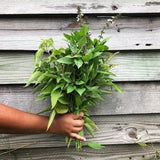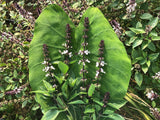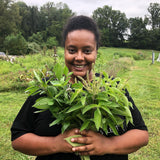Besobela (Ethiopian Basil)
Ocimum spp.
Besobela is a unique herb associated with the injera/wat cuisine, which evolved in the highlands and mid-highlands of hinterland Ethiopia.
Its main purpose is to add flavor in the preparation of berbere, shiro, and clarified butter (clarified/infused cooking butter for wat/alicha is different from the Gurage/kitfo version - an important detail that's often overlooked). It's also added to white shiro and alicha during the last minute of cooking as a finishing herb.
This fragrant, purple-flowered basil grows wild and cultivated in Ethiopia where it is harvested by hand, sun-dried, and pulverized for cooking.
Thank you to Menkir Tamrat for providing some of this description.
Our seed came from seed keeper Blair Williams who was given the seed by an Ethiopian woman who visited his garden when he lived in Los Angeles. In these photos you can see Besobela arranged on a taro leaf, as well as our dear friend Bilen Berhanu holding a bouquet of Besobela (purple flower) and Vana Tulsi (light green flower), which she took home to her mother to grind in to her spice mixes.
Also known as: Besobela, Bassobela, Ethiopian Basil, Ethiopian Sacred Basil, Basobila.
Days to maturity: 60-70
Seeds per pack: 100-120
Germination rate: 54% on 02/18/2025
Planting / harvesting notes
Sow seeds on the surface of moist potting soil and keep it evenly moist and in the sunlight until germination. Start indoors, and later transplant in full sun 10-12 inches apart. Continually harvest - this plant is a vigorous grower in warmer months.
Seed keeping notes
Allow seedheads to dry on the plant. Cut the stalks below the lowest seed clusters. If necessary, dry the seedheads further in the sun on a sheet or table away from moisture and precipitation. When fully dry, whack the seedheads in a bucket, allowing the ripest seed to fall. Sift through strainers to remove the largest chaff, and then winnow off the lighter chaff with your breath, a fan, or the wind.











